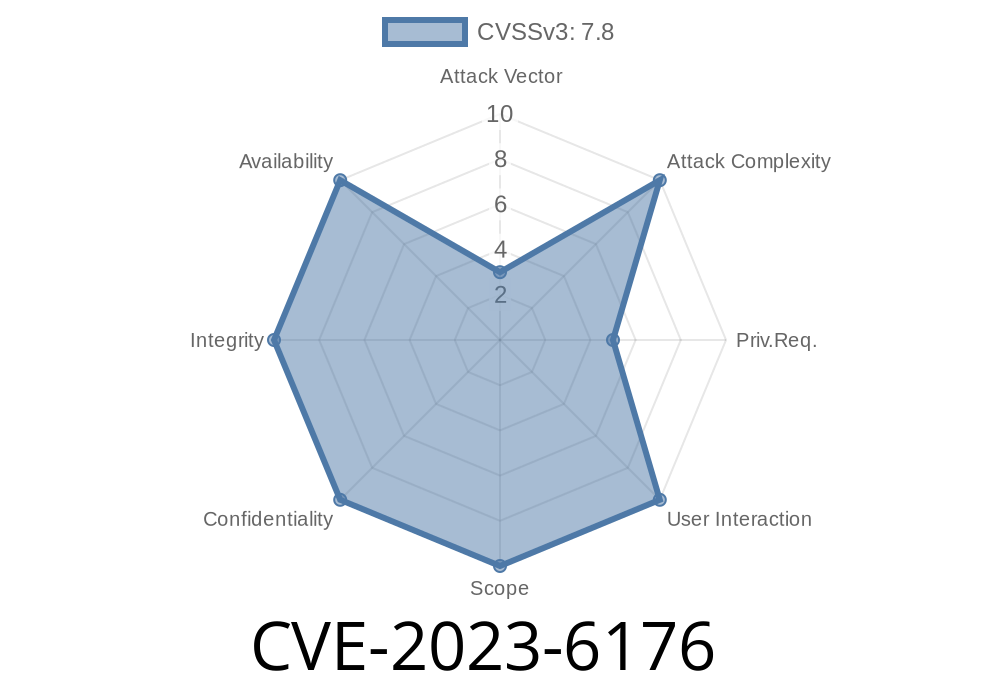In late 2023, security researchers discovered a flaw in the Linux kernel: CVE-2023-6176. This vulnerability affects the cryptographic algorithm API, specifically the "scatterwalk" helper, opening the door for attackers to crash systems or even escalate privileges. Here's an easy-to-understand deep dive into how it works, with example code, references, and potential exploitation paths.
What Is CVE-2023-6176?
This CVE is about a null pointer dereference in the Linux kernel's cryptographic API, in a piece called "scatterwalk" (think of this as managing how data is scattered and gathered in memory for crypto functions).
This bug means if you feed the kernel a specially-crafted series of packets through a socket (network endpoint), the kernel can accidentally try to use a pointer that isn't set. In computer terms, that’s like asking for the address of a house that doesn’t exist. Usually, this causes a system crash (kernel panic), but with creativity, it may also allow hackers to run code with administrator powers.
Where Did the Bug Happen?
The root of the problem is in the Linux kernel code handling cryptographic operations with scatter/gather lists, mainly in functions around crypto/scatterwalk.c. When constructing sockets with af_alg (Linux's way of giving userspace access to crypto algorithms), an attacker can make the kernel run into an uninitialized pointer situation.
Kernel tries to set up scatterlist data structures for the cryptographic operation.
- If details are just right (or wrong), pointer ends up null, and the next access panics the kernel.
Here is a simplified example (in C) to demonstrate the generic problem
struct scatterlist *sg = get_scatterlist_from_socket(sock);
if (!sg) {
// sg is NULL, but in the flawed code, this check is missing!
}
// ...
crypto_scatterwalk_map(sg);
// If sg is NULL, the kernel crashes here: NULL pointer dereference.
Triggering the Bug: Example Exploit Scenario
This crash (or possible privilege escalation) could be triggered by a *non-root* user, using Linux's af_alg sockets, often exposed on typical desktop/server kernels.
Here’s a minimal proof-of-concept in Python
import socket
import os
# This requires CAP_NET_ADMIN or similar, depending on distro settings
sock = socket.socket(socket.AF_ALG, socket.SOCK_SEQPACKET, )
sock.bind(('hash', 'sha256'))
# Sends an invalid msg that can trigger the NULL pointer bug
try:
sock.send(b'')
except Exception as e:
print(f"Crash triggered: {e}") # This may crash the kernel!
*Warning: Running this may immediately crash your Linux machine if it's unpatched. Only test in a VM you can easily recover!*
What Can Happen?
- Privilege Escalation: With some clever heap spraying, an attacker might turn the kernel panic into code execution, giving them root (admin) access.
- Denial of Service: The easiest impact is an instant system crash! On a multi-user system (server, shared hosting, container), a user can take down the whole thing.
Mainline: 6.6.8, 6.1.67, and other supported stable lines.
- Check Linux Kernel Stable for latest releases.
The relevant patch commit can be found here:
scsi: fix null pointer dereference in scatterwalk functionality
How to Stay Safe
- Update Your Kernel: All major Linux distros have shipped patches. Run uname -r and compare your version to your distro's advisories or the NVD entry.
- Restrict Users: If updating is not possible, restrict who can access af_alg or load kernel modules.
References and Further Reading
- NVD Entry: CVE-2023-6176
- Kernel Patch Commit
- Original LKML Patch Discussion
Conclusion
CVE-2023-6176 is another reminder that even complex, modern kernels can crumble from a simple coding error. Always keep your systems patched and be alert to reports about vulnerabilities in parts of the system (like crypto APIs) that are rarely touched by regular users, but deadly when mishandled.
*Be safe, stay patched, and happy hacking — responsibly!*
Timeline
Published on: 11/16/2023 18:15:07 UTC
Last modified on: 11/23/2023 03:42:18 UTC
